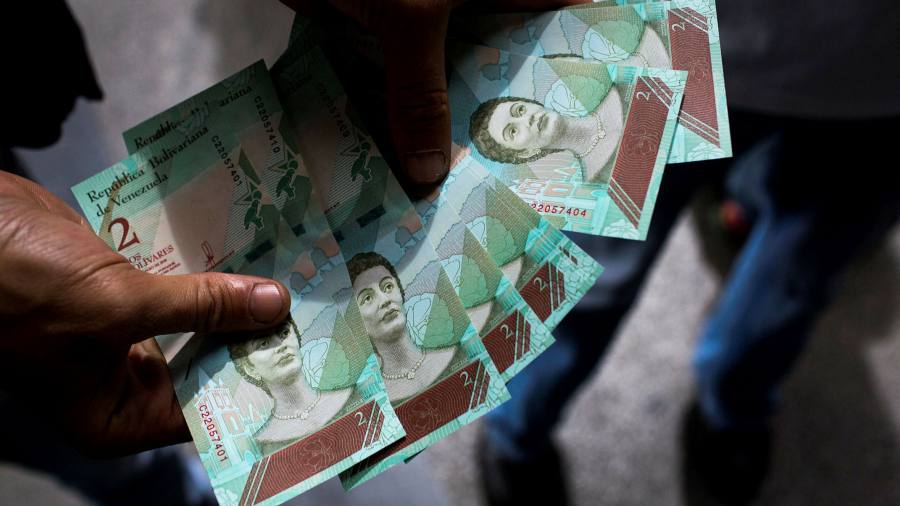[ad_1]
Dr. Thomas Laryea is an international law and policy expert at Orrick, Herrington & Sutcliffe. He specialises in advising governments and creditors on international finance. In this post, he argues for reconsideration of the over reliance on sanctions, particularly the ban on secondary trading on Venezuela bonds, as we look towards a comprehensive debt restructuring.
The Biden administration has an opportunity to reshape relations with Venezuela, and to lay the groundwork for the restructuring of Venezuela’s $150bn plus in public external debt. For over 15 years, the United States has imposed numerous economic sanctions on the Latin American nation and others have followed suit. The use of sanctions reached its heights under the Trump administration, where they were deployed for a wide array of policy objectives, ostensibly including regime change. Few policymakers can claim that these sanctions have achieved their stated objectives.
The ban on certain trading in Venezuela bonds stands out as one of the most peculiar and ineffective sanctions. It started in August 2017 with a ban on US persons participating in the issuance of new non-short-term debt by Venezuela, as well as a ban on secondary market purchases of the assets by US persons, or within the United States. Simultaneously, the US authorities issued a licence that exempted trading in most Venezuelan eurobonds (other than bonds held by the Republic itself). Then, in January 2019, the American authorities removed the exemption on the bonds issued by the state-owned oil company Petróleos de Venezuela (PDVSA) and thus subjected them to the trading ban, but retained the exemption on certain other bonds issued by the Republic.
It was a head-scratcher. It’s understandable that US persons be banned from directly financing the Venezuelan government. But the ban on secondary market transactions? Less so. And given the US jurisdictional limitations of the ban, why seek to impose it when others in the global bond market are unaffected? And, to boot, why a trading ban on PDVSA’s bonds but not the Republic’s?Â
Some have speculated the goal was to depress the price of the PDVSA bonds in order to induce a future debt restructuring. But why would the US government use sanctions to differentiate between the PDVSA and the Republic’s bonds in this way and affect inter-creditor equity in a prospective sovereign debt restructuring that US sanctions were already precluding? After much market clamour, a few weeks later the distinction between PDVSA and the Republic’s bonds was removed, in effect subjecting them both to the trading ban.
The apparent rationale for the trading ban was that it stopped entities associated with the Maduro administration from benefiting through the secondary market. But if that was the case, then why not address it in a tailored fashion by adding these individuals to the list of Specially Designated Nationals with whom US persons are prohibited from financial dealings? There’s been no good answer.
Questionable precedent
In addition to continuing to defy rational explanation, the secondary market trading ban sets a questionable precedent in terms of US financial market regulation. The risk of replication of the Venezuela trading ban in other sovereign debt situations needs to be internalised in the markets going forward, potentially pushing some legitimate activity outside of the United States.
Some market participants are seeking to mitigate such risk by proposing provisions in sovereign bond documentation that would permit acceleration of the payment terms in circumstances where a similar secondary trading ban is imposed. Such risk mitigation tools are in the “laboratory†stage and their potential effectiveness would depend on the particular circumstances of each case.
In the meantime, the costs of the trading ban in the Venezuela situation are being absorbed by the debt holders, rather than the associates of the Maduro administration. Relative to their already distressed prices at the time of the trading ban’s imposition, the Republic’s and PDVSA’s bonds have fallen 80 per cent. While the crash in bond prices can be attributed to a range of factors, the effect of the trading ban in the United States, where the vast majority of the trading of these bonds has traditionally taken place, was certainly a factor.
The Biden administration has already begun to reconsider some of the sanctions against Venezuela where it’s evident that the measures have had negative effects. In particular, sanctions that hinder port and airport operations have been eased and ones that hinder responses to the COVID pandemic are being reconsidered. This development is sound in terms of recognising the humanitarian needs of the Venezuelan people. Similarly, we should recognise that the effect of balkanising global capital markets is also unsustainable.
Removing the trading ban would not address all the issues with resolving Venezuela’s debt challenges, which run deep and flow from chronic economic and institutional failures. However, removing the trading ban would send a signal of willingness to correct missteps and a commitment to work towards potential solutions that appropriately leverage, rather than hinder, market functioning.Â
In a previous post on FT Alphaville, I noted that the potential Venezuela debt restructuring would require a concerted international effort. I proposed a way to facilitate a comprehensive restructuring of Venezuela’s debt through the establishment of an international trust under the legal framework of the IMF. It is time to consider such progressive ideas and to put aside the regressive measures, typified by the trading ban.
[ad_2]
Source link





